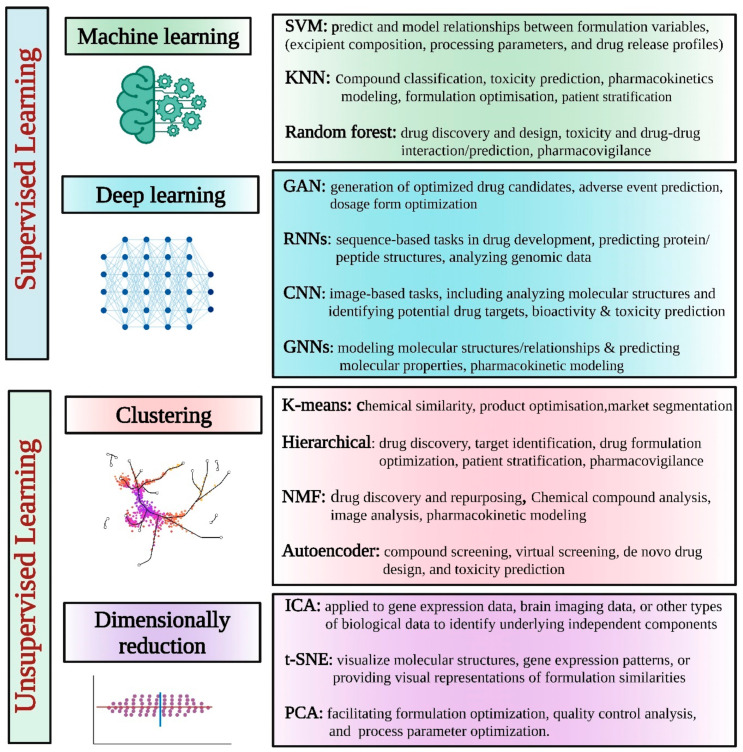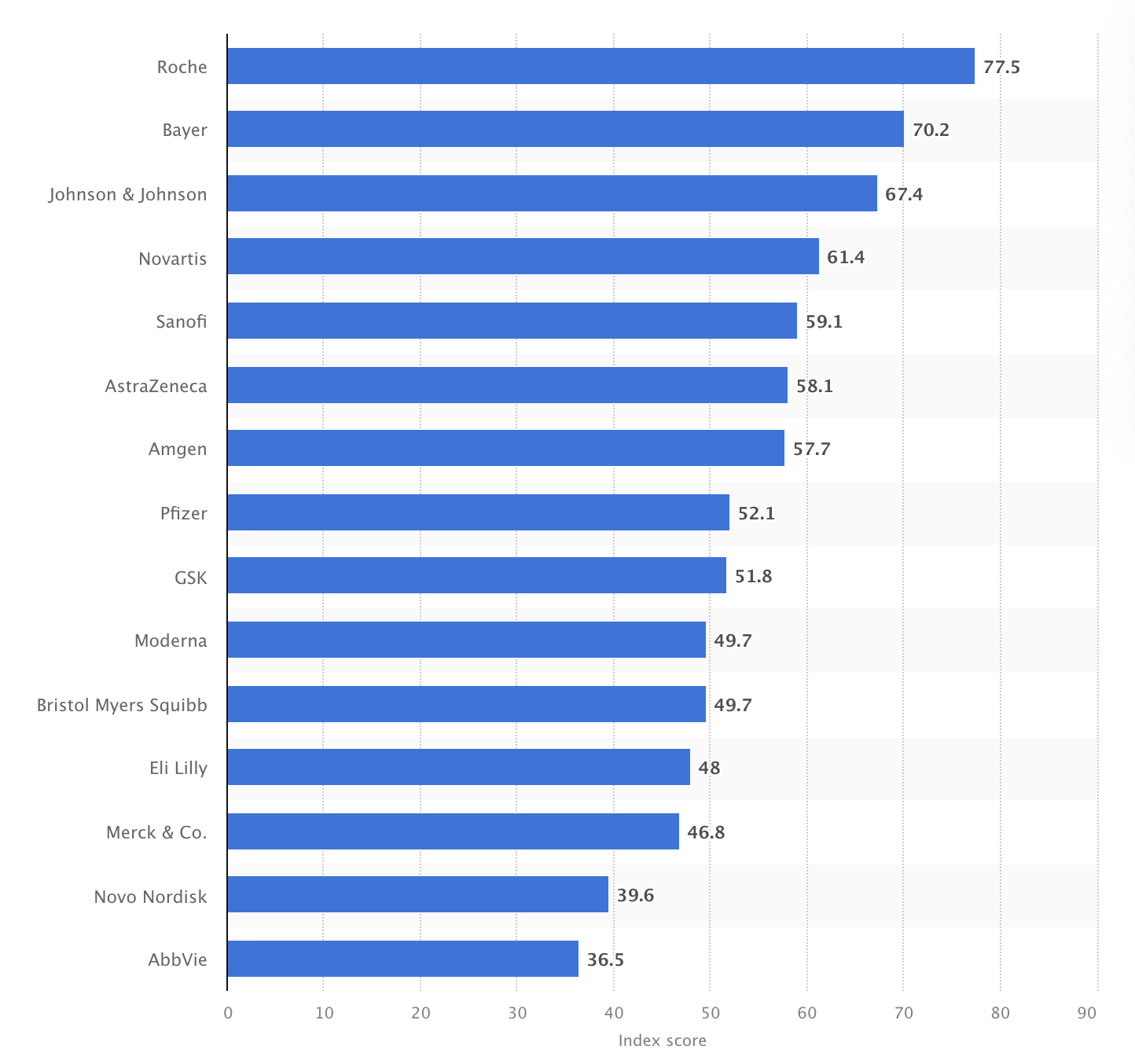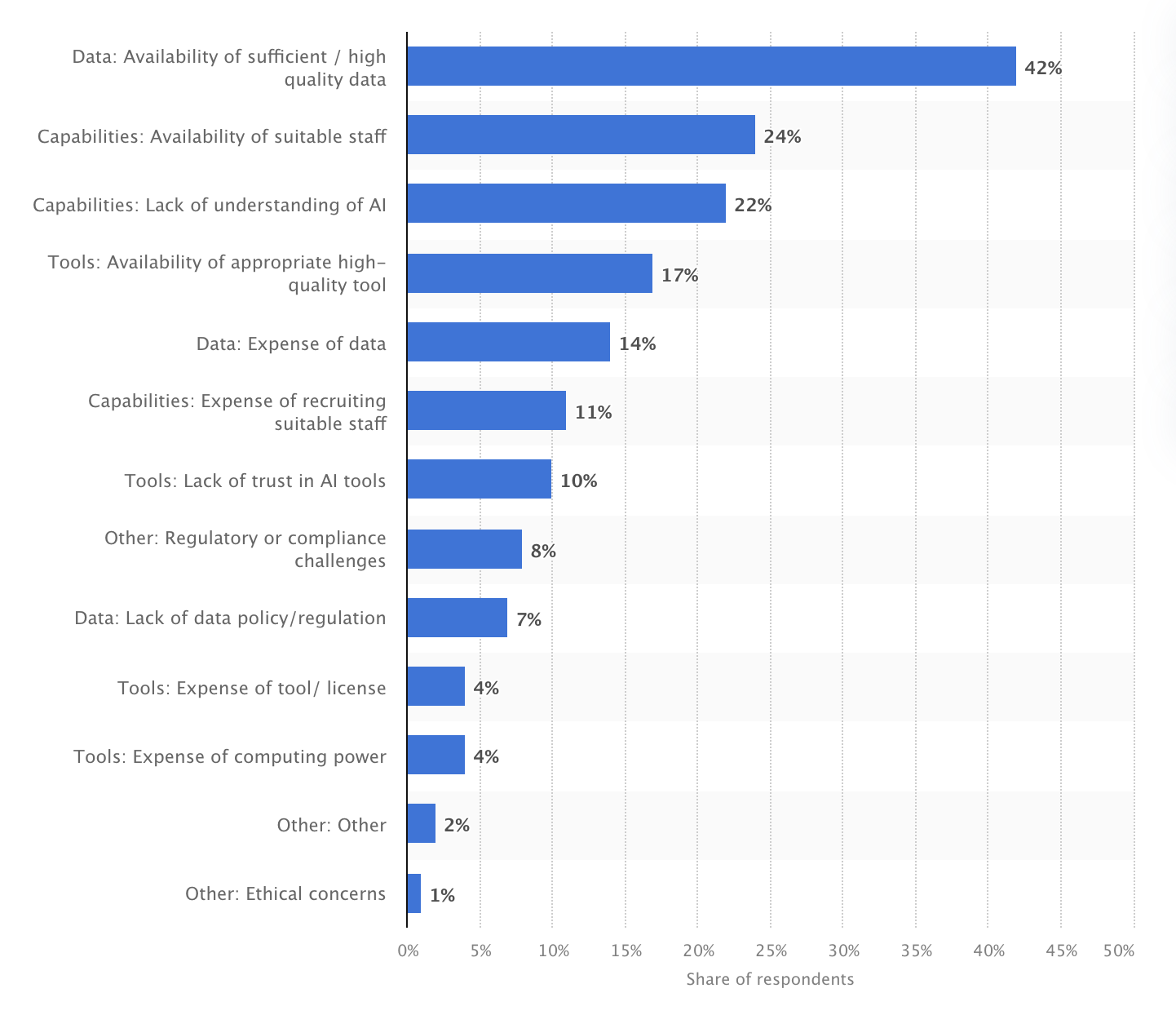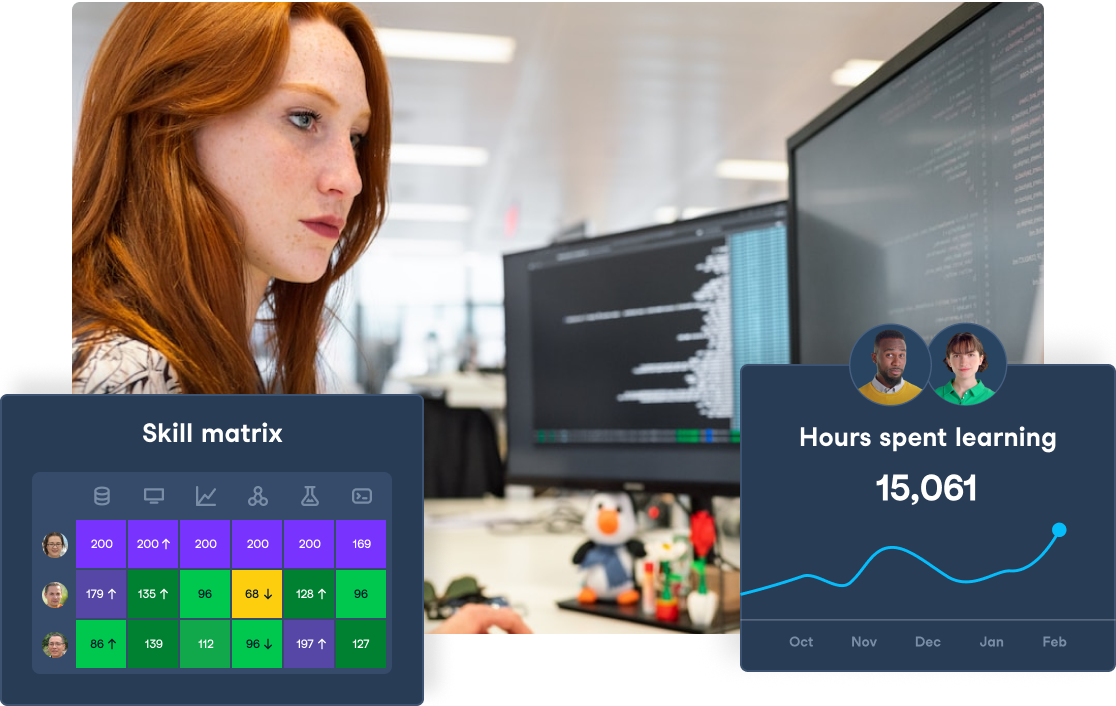Course
The rapid adoption of Artificial Intelligence (AI) is driving big changes and making a significant impact on several industries, and pharmaceuticals is no exception.
Including AI tools in drug discovery and development can transform how pharmaceutical companies research, develop, and bring solutions to the market. Using the huge amount of available data and machine learning algorithms, AI can speed up drug development, uncover new therapeutic targets, and personalize treatment options with high precision.
However, similar to any other new and revolutionary technology, the potential benefits come with significant challenges and considerations, including concerns about data privacy, the complexity of integrating AI systems into existing workflows, and the need for specialized skills.
This article describes the benefits and challenges of using AI in the pharmaceutical industry. It will give insights into how these technologies are reshaping the sector and explore case studies, examples, and prospects.
Overview of AI in Pharmaceuticals
Let’s start with the basics: What is AI? AI is a branch of computer science focused on building systems that can perform tasks usually requiring human intelligence, such as learning from data, recognizing patterns, and making decisions.
AI is becoming a powerful and helpful tool for modernizing and enhancing critical processes in the pharmaceutical industry.
Traditionally, drug discovery is a long, complex process involving extensive research and trial and error. AI accelerates this by analyzing large datasets, including genetic information and chemical compounds, faster and more efficiently.
Machine learning algorithms can identify potential drug candidates and predict the probability that they are effective in certain conditions. They do that by recognizing patterns in the data, which, in turn, shortens the development cycle and reduces costs.
AI can also transform clinical trials by optimizing participant recruitment, monitoring patient responses, and predicting potential side effects. This can make the trials more targeted and efficient, leading to faster and more reliable results.
Moreover, AI improves personalized medicine by analyzing individual patient data, such as genetic information and lifestyle factors, to select treatments specifically for each person, which can improve treatment outcomes and prevent some adverse reactions.
AI technologies can simplify some aspects of pharmaceutical operations. They can help automate routine tasks and provide insights into market trends and patient needs.
As pharmaceutical companies leverage AI technology capabilities, they help boost and improve research and development, which can translate into improved patient care and a more responsive healthcare system.

Projected global AI in the drug discovery market from 2023 to 2032 (in billion U.S. dollars). Image source: Statista.
Applications of AI in Pharmaceuticals
The impact of AI in the pharmaceutical sector is particularly transformative. Over the past few years, an increasing number of pharma companies have adopted AI tools in their processes. This has the potential to increase innovation and make the industry more efficient.
As mentioned before, AI can significantly impact several aspects of pharmaceutical processes, including accelerating drug discovery, optimizing clinical trials, and personalizing patient care.
Let’s analyze the most common and promising applications of AI in pharmaceuticals and the benefits AI brings to each of them.

Different AI learning models and tools for pharmaceutical applications. Image source: National Library of Medicine.
Drug discovery and development
One area where AI has the most significant impact is drug discovery and development.
Traditionally, discovering new drugs was a time-consuming and costly process, often taking several years and a significant financial investment. AI has revolutionized this process by speeding up the identification of potential drug candidates. Researchers can analyze huge amounts of chemical, biological, and clinical data through machine learning algorithms to uncover potential candidates faster and more accurately.
The AI algorithms can predict how different molecules interact with biological targets, helping to identify which compounds have the highest potential for therapeutic benefit.
Moreover, AI plays a crucial role in predicting drug efficacy and toxicity. By evaluating data from previous research and clinical trials, AI models can forecast the effectiveness of a new drug and the probability of adverse effects before the drug enters clinical testing. This predictive capability accelerates the drug development process and reduces the risk of failure in later stages.
Develop AI Applications
Clinical trials
AI is also transforming the approach of clinical trials. This phase is essential for testing new treatments and ensuring their safety and effectiveness. Traditionally, designing and managing clinical trials was a complex and resource-intensive task. AI optimizes this process by improving trial design, patient recruitment, and monitoring.
By analyzing patient records, AI algorithms can identify individuals who meet specific criteria, simplifying the recruitment process and ensuring that trials include participants most likely to benefit from the treatment under study. This targeted recruitment helps to reduce the time and cost associated with finding suitable candidates.
Once a trial is underway, AI systems continuously monitor patient data, detecting early signs of adverse reactions or deviations from expected outcomes.
Drug safety and adverse event monitoring can significantly benefit pharmacovigilance processes. By analyzing several data sources, such as electronic health records, social media, and health forums, previously unknown side effects and potential drug interactions can be identified, leading to more proactive and effective risk management.
Moreover, AI is very helpful in analyzing trial data to uncover patterns and trends that may not be immediately apparent. AI can identify correlations and insights that help understand the efficacy and safety of new treatments, leading to more informed decisions and uncovering new applications for existing drugs.
Personalized medicine
Conventional treatment methods often take a generalized view of patient care, which may be ineffective for some patients. Pharmaceutical companies are using AI to analyze individual patient data that is then used to predict treatments specifically suited to their needs.
Personalized treatment plans can be predicted using a patient’s unique genetic makeup, lifestyle factors, and medical history. This approach ensures that treatments are more effective and less likely to cause adverse reactions.
Moreover, advanced AI algorithms can analyze complex genetic data to identify mutations or biomarkers associated with specific diseases. This genomic insight supports the development of precision medicine, where therapies target the underlying genetic factors of a patient’s condition, leading to more effective and customized treatment options.
Supply chain and manufacturing
The applications of AI technologies go beyond drug development and patient treatments. Supply chain and manufacturing processes are two other areas where AI can greatly impact.
Effective supply chain management is very important to ensure that medications are available properly. AI models can analyze historical data, market trends, and other variables, forecast and predict demand, and optimize inventory management. This helps reduce the risk of drug shortages and overstocking.
AI improves manufacturing processes by monitoring equipment performance and assuring product quality. Predictive maintenance algorithms can forecast equipment failures, minimizing downtime and maintaining smooth production operations.
Moreover, automated inspections and real-time monitoring help ensure that products meet strict quality standards and comply with regulatory requirements, reducing the chance of errors and improving overall product safety.
|
Application |
Description |
Benefits |
|
Drug discovery & development |
AI algorithms analyze large datasets to identify potential drug candidates faster and more accurately. |
- Reduces time and cost of drug development. - Improves accuracy in predicting successful drug compounds. |
|
Clinical trials |
AI optimizes trial design, participant recruitment, and data monitoring. |
- Accelerates recruitment of suitable participants. - Enhances monitoring for better safety and efficacy. |
|
Personalized medicine |
AI analyzes patient data to create customized treatment plans based on genetics and lifestyle. |
- Improves treatment outcomes. - Reduces the likelihood of adverse reactions. |
|
Supply chain management |
AI models forecast demand and optimize inventory management. |
- Minimizes drug shortages and overstocking. - Enhances efficiency and reduces waste. |
|
Manufacturing |
AI monitors equipment performance and ensures product quality through predictive maintenance. |
- Reduces downtime with predictive maintenance. - Maintains high-quality standards and compliance. |
|
Pharmacovigilance |
AI analyzes data to identify adverse drug reactions and ensure patient safety. |
- Detects potential side effects early. - Improves risk management and patient safety. |
Summary of applications of AI in the pharma industry.
Challenges and Considerations
The pharmaceutical industry can be largely transformed by adopting AI tools in different stages of its processes. However, its successful implementation comes with several challenges and considerations that must be carefully addressed. Let’s examine them in close detail.
Data privacy and security concerns
One of the main concerns faced when integrating AI into pharmaceuticals is assuring data privacy and protection.
Even though many industries use huge amounts of data when developing AI models, the pharmaceutical sector is peculiar because data includes sensitive patient information and must be protected against breaches and unauthorized access.
Pharmaceutical companies must adhere to strict data protection regulations, such as GDPR in Europe and HIPAA in the U.S., to ensure that patient data is handled with the highest level of security. Implementing robust encryption methods and secure data storage solutions is essential to protecting this valuable information and maintaining public trust.
Integration with existing systems and workflows
Integrating AI solutions with existing systems and workflows can be complex and requires modern infrastructure, which many pharmaceutical companies lack.
These companies usually have legacy systems that may not easily interface with cutting-edge AI tools.
Combining machine learning and artificial intelligence technologies into these established processes requires careful planning and customization to avoid disruptions. Pharmaceutical companies need to assess their current infrastructure, identify potential integration challenges, and invest in necessary upgrades to ensure that both systems work harmoniously with existing technologies.

Index of AI readiness of select big pharma companies as of 2023. Image source: Statista.
Ethical considerations in AI decision-making
Integrating AI in pharmaceuticals carries one critical concern and one of the most criticized points: the ethical aspects of involving AI in decision-making.
Algorithms that influence drug development or patient treatment decisions should be transparent and free from biases. Guaranteeing that AI models operate fairly and do not perpetuate existing inequalities is essential. However, it's also one of the most challenging points to address.
The biases in machine learning mainly come from the data collection, which can sometimes not be gathered fairly due to human biases.
Establishing ethical guidelines and human oversight of mechanisms can help to use AI tools more responsibly and ensure ethical standards are followed when making decisions based on AI-predicted outcomes.
Regulatory and compliance issues
Regulatory and compliance issues are another significant consideration. The pharmaceutical industry is highly regulated, and the use of AI in drug development and clinical trials must comply with various regulatory requirements. Navigating these regulations requires careful coordination with regulatory bodies to ensure that AI models meet all necessary standards, which can involve considerable time and resources.
Skilled personnel
Successful implementation and management of AI systems require a skilled workforce. Data scientists, AI specialists, and other professionals with AI and machine learning expertise are essential for developing, interpreting, and managing these technologies. Recruiting and retaining talent with the proper skill set can be challenging, especially given the competitive market for tech professionals.
Investing in training and development for existing staff can also help bridge the skills gap and ensure that the organization can fully leverage AI capabilities.
As seen in the graph below, one of the most prominent barriers to AI adoption in drug discovery is the lack of suitable staff and a lack of understanding of AI.

Leading barriers for AI adoption in drug discovery in high-income countries worldwide as of 2023. Image source: Statista
Case Studies and Examples
Examples of AI models used in different case studies can be found across the Pharmaceutical area. Let’s review some of them.
BenevolentAI and the COVID-19 pandemic
BenevolentAI, a UK-based biotech company, used AI to accelerate drug discovery for COVID-19. The company’s AI platform analyzed existing data from various sources, including scientific literature, clinical trials, and patient data, to identify potential treatments. BenevolentAI’s AI algorithms identified the existing drug Baricitinib, typically used for rheumatoid arthritis, as a promising candidate for COVID-19 treatment.
The drug's identification was based on its ability to inhibit a key protein involved in the inflammatory response triggered by COVID-19. Baricitinib was later authorized for emergency use in treating COVID-19.
IBM Watson for healthcare
IBM Healthcare uses AI to match patients with suitable clinical trials. IBM Watson’s natural language processing (NLP) technology scans medical records and trial protocols to identify potential matches.
Watson analyzes patient data against clinical trial requirements to suggest trials that fit the patient’s condition and history. This AI-driven approach is said to increase patient recruitment efficiency and help in faster and more accurate matching.
Tempus and cancer treatment
Tempus, a technology company specializing in precision medicine, leverages AI to analyze genomic data and provide personalized treatment recommendations for cancer patients.
Tempus uses AI algorithms to process and interpret genomic sequencing data, identifying mutations and patterns that inform treatment decisions. Tempus helps specialists tailor treatment plans to each patient’s tumor's specific genetic profile.
NVIDIA and adverse drug reaction prediction
NVIDIA collaborates with pharmaceutical companies to use AI to predict adverse drug reactions.
These models analyze large datasets of clinical trial reports and post-marketing surveillance data to predict potential adverse reactions and identify safety signals beforehand. They were also developed to identify safety concerns at early stages, allowing proactive measures to be taken.
Johnson & Johnson and AI in production
Johnson & Johnson has integrated AI into its manufacturing processes to optimize production and quality control.
The company uses AI algorithms to monitor and control manufacturing processes in real time, detecting anomalies and ensuring consistent product quality. This helps maintain high production standards and efficiency, reduce waste, and improve manufacturing performance.
Future Prospects of AI in Pharmaceuticals
The AI field constantly evolves, suggesting that its role and implications in the pharmaceutical industry can grow exponentially. Currently, key trends and potential advancements are likely to shape the future of AI in this field.
Using AI techniques and advanced tools such as quantum computing could enable researchers to simulate complex molecular interactions, speeding up the identification of possible drug candidates.
AI platforms might also increasingly incorporate real-time data from ongoing clinical trials, making drug development processes more dynamic and adaptive.
Future developments in genomics and other omics could also affect the role of AI systems, as they can analyze comprehensive biological datasets to uncover new biomarkers and therapeutic targets. This could drive advancements in personalized medicine, allowing for more precise treatments tailored to individual genetic profiles and disease mechanisms.
Using more complex models in predictive analytics for clinical trials could improve patient response forecasting, trial protocol optimization, and potential issue identification.
Lastly, as AI becomes more integrated into critical pharmaceutical processes, there should be a stronger focus on ethical AI and explainability. Future advancements should aim to make AI decisions more transparent and understandable, ensuring responsible AI use and accessible outputs that should also be readily interpretable by humans.
Conclusion
AI technology is transforming the pharmaceutical industry's drug discovery, development, and personalized medicine through enhanced efficiency and data analysis. The application of AI in Pharmaceuticals has the potential to speed up treatment identification and optimize clinical trials, benefiting patient outcomes.
Despite this, challenges like data privacy, biases, regulatory issues, and ethical concerns about decision-making need addressing. As AI technology evolves, there could be more changes and improvements in the pharmaceutical sector that should be accompanied by the strongest focus on ethical AI and explainability.
DataCamp is working hard to provide comprehensive and accessible resources to keep updated with AI development. Check them out:
Elevate Your Organization's AI Skills
Transform your business by empowering your teams with advanced AI skills through DataCamp for Business. Achieve better insights and efficiency.

FAQs
How is AI being used to predict future health trends in pharmaceuticals?
AI is increasingly used to analyze large-scale health data, including electronic health records and population health statistics, to predict future health trends. This can help pharmaceutical companies anticipate emerging health challenges, identify potential new drug markets, and tailor their research and development efforts accordingly. By forecasting trends such as the rise in chronic diseases or the impact of aging populations, AI helps the industry stay ahead of the curve.
Can AI help in reducing the environmental impact of pharmaceutical production?
Yes, AI can contribute to more sustainable pharmaceutical production by optimizing manufacturing processes, reducing waste, and improving resource management. AI-driven predictive maintenance reduces downtime and minimizes the waste of raw materials. Additionally, AI can optimize supply chains to lower carbon footprints by improving logistics, reducing unnecessary transportation, and cutting down on excess inventory.
What role does AI play in enhancing patient adherence to medication?
AI-powered tools are being developed to monitor and improve patient adherence to prescribed medication. These tools can analyze patient behavior, send reminders, and offer personalized support through apps or virtual assistants. Using data from wearable devices, AI can also detect patterns that suggest a patient may be at risk of non-adherence and intervene early with tailored advice or follow-up from healthcare providers.
How can AI aid in repurposing existing drugs for new therapeutic uses?
AI algorithms can analyze vast amounts of biological and chemical data to identify new therapeutic uses for existing drugs. By examining drugs' molecular structure and mechanism of action, AI can predict their potential effectiveness against other diseases or conditions. This approach has already led to repurposing drugs for treating diseases like COVID-19, where existing medications had unexpected benefits.
What are the potential risks of over-reliance on AI in pharmaceuticals?
While AI offers significant advantages, over-reliance on AI in pharmaceuticals carries risks, including algorithmic errors, lack of transparency in decision-making, and the possibility of overlooking human intuition and expertise. AI systems may also struggle with novel situations that fall outside their training data, leading to incorrect predictions or decisions. Therefore, it's crucial to maintain a balance between AI-driven processes and human oversight to ensure safety and effectiveness.

